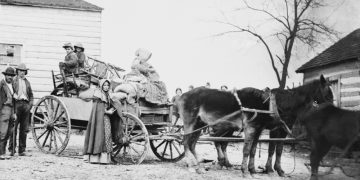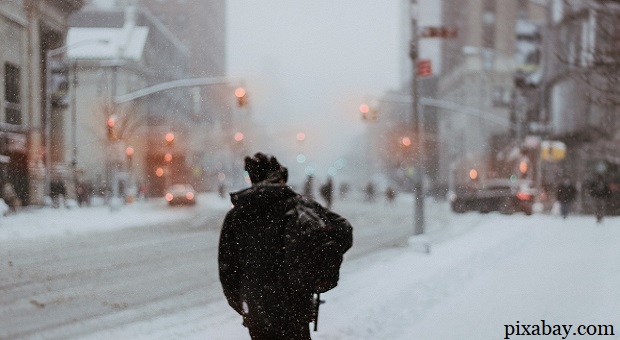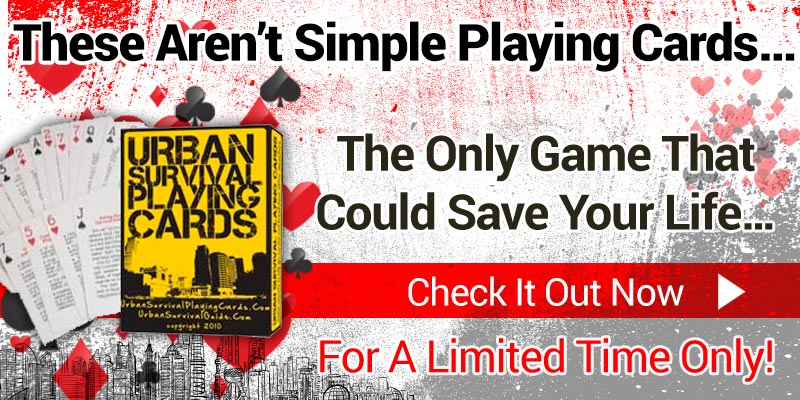The winds of change are blowing, and we need to be ready when they do. In addition to the current political climate, we also have the actual climate to deal with, and for most of us, that means dealing with winter temperatures and conditions.
Surviving a disaster in July is one thing – you may be hot, but you can reasonably take care of yourself in a manner that keeps you alive as long as you have food, water, and shelter with no extra effort.
Winter, on the other hand, is an entirely different survival beast. In some climates, you can be dead within minutes if exposed to the weather without proper attire and equipment.
The two biggest causes that I see, over and over, when somebody gets into trouble or even dies because of winter conditions are lack of knowledge and lack of preparedness. One usually goes hand in hand with the other, but there are those out here who know what to do, but don’t believe anything will happen to them.
Those are the ones who really upset me because they KNEW. So, the first bit of advice that I’m going to offer is this: don’t make the potentially lethal mistake of thinking that it won’t happen to you. If you knock on the pearly gates and ask to interview folks who knew but didn’t prepare, they’ll no doubt tell you one thing: they didn’t think it would really happen.
So, learn from their mistakes.
“Usual” Disasters to Expect in Winter
This is going to depend heavily on your location. If you’re in the northern US, you’re going to see lots of snow, ice, and brutally cold temperatures. If you’re in the southern part of the US, you won’t likely see as much snow, but you may see heavy rains and low temperatures.
Along with that winter weather, there are some “usual” disasters that you should pretty much assume are likely possibilities. These aren’t considering things like WWIII, so account for the big disasters separately!
Frozen Pipes
If you’ve lived through a northern winter in an older house, I bet you can remember at least one morning when you got up, went to turn on the water to make coffee or brush your teeth, and got nothin’. Faucet wide open, but not a drop coming out. Congratulations – you’ve lived through frozen pipes.
Now, this is a situation that can range from inconvenient to financially disastrous depending upon whether they just froze, or if they froze and burst. If they just froze, you have to wait it out. A blow dryer is often helpful, but not always, depending on where it was frozen.
If they burst, look out. It’s going to be expensive and messy. You’re going to have to replace the pipe, plus when it defrosts, you’re going to have water everywhere. Or, depending on where it froze, you may have a burst that leaks immediately.
Frozen Car Doors/Locks
I can’t even tell you how many times I’ve gone outside to get in my car and the locks were frozen, or the doors were completely frozen shut. Fortunately, this is a relatively easy fix – buy a house with a garage. Just kidding – there really are a couple of quick fixes.
There are commercial de-icers you can use, but the easiest way is to just find the door that seems the least stuck and push into it all the way down the sides and top in order to pop the ice loose. If this fails, try a hairdryer. If you just force the door open, you risk damaging the seals, so be gentle.
Same thing with the key; don’t torque on it when it’s obviously not working. If the lock freezes, try warming the key, then putting it into the lock because what’s happened is that water’s gotten down in there and frozen the mechanism together. Hand sanitizer works too as long as it’s the alcohol-based type. And again, there are commercial de-icers.
Blizzards
If you’ve ever been through a good blizzard (or a bad one, depending upon your take on blizzards), then you know that they’re deathtraps if you’re not careful.
Just a few concerns that accompany blizzards are:
- Collapsed roofs
- Downed powerlines
- Decreased or no visibility during the storm.
- Extreme wind
- Downed trees that can prevent you from leaving the house
- Deep snowdrifts
Your best bet when you know that a blizzard is coming is to get ready to hunker down. This means:
- Have your food, water, and meds stockpiled
- Have plenty of wood ready in a location close enough to the house that you don’t have to go far to get it
- Have a rope tied from the house to necessary points that you may need to get to outside, such as to the barn or the emergency vehicles
- Have candles and other non-electrical sources of light handy
- Have a back-up heat source because there’s a good chance that you’ll lose power in the storm
- Have plenty of blankets ready
Road Ice
It’s impossible to avoid unless you don’t ever leave the house. At some point in the winter, you’re going to drive on ice. I can’t overemphasize the value of tire chains and caution. Between the two, you have a pretty good chance of getting where you’re going if you absolutely must drive.
If you begin to skid on ice, steer into the skid rather than away from it in order to help you regain control. Don’t hit the breaks – tap them instead. Leave plenty of room between you and the car in front of you and pay extra close attention to your surroundings. If kids or dogs run out in front of you, your stopping time is going to be much slower than on a dry road.
Power Outages
Losing power in winter can quickly become a critical situation, and the weight of snow on lines frequently causes it. You need to be prepared regardless of whether you live in an apartment or in a farmhouse in the country. You’re going to need two things: at least one source of heat to keep you warm and one to heat up food/water. Lights are nice, too.
I recommend keeping some kind of space heater that doesn’t require electricity, such as a camp heater that runs on oil or propane. Fireplaces are great too, if you have one. Best of all would be a wood-burning stove, if you’re in a place where you can have one.
A Few Suggestions
If you get stuck outside in a survival situation in the summer, you’ll likely survive as long as you can find food and water. Not so in the winter. I know that we’ve talked mostly about city survival, but these rules apply to anywhere.
It’s imperative that the first thing you do if SHTF during the winter is make sure that you have solid shelter and a source of heat that will keep you from freezing to death. Be aware that this is going to be everybody else’s goal too, so if it gets really bad, you want to stay out of sight.
After you have shelter, then it’s time to make sure that you have the other two keys that are critical to your survival: water and food. Hopefully you’ve managed to stockpile enough and are able to just hunker down in your home and wait it out, but if not, have a backup plan. Then have a backup plan for your backup plan.
Contingencies are always a good thing when you’re trying to manage something as fickle as the weather!
Check your supplies, especially the ones in your car, every week or so to make sure that they’re still dry, unfrozen, and in good shape. Nothing would suck more than pulling out the one clean, dry change of clothes you think you have, only to find out that they’ve had a quart of oil leak all over them. Keep track of that!
Surviving winter is a different animal than surviving other times of the year, but if you manage it properly and plan it well, things can most certainly turn out just fine!
Just learn the tricks and be prepared – it’s all you can do!
This article has been written by Theresa Crouse for Survivopedia.






















































































HELLO, Theresa. Top Item to Remember: If you Do Not Have sufficient Nourishment/ Calories (Good Food), You will Not Win against very cold temps. for long – No Matter how good your shelter is . . .
If you have anti-lock brakes on your vehicle, you should NOT tap the brakes; you will stop faster by holding steady pressure on the brake pedal. If you have an older vehicle without anti-lock brakes, your advice on pumping the brakes is valid.
And then there are the deer on the roads…
I live in Orlando now, but I recall the times I lived in Virginia and how scary it was at times to drive on slushy streets and suddenly slip or take a long slide before finally coming to a stop. I used to drive at least 30 minutes one way., always commuting back and forth between Dale City and Manassas., which meant an hour minimum of driving country roads and through suburban and busy city areas. Long, long stretches of road.
And one year in particular, I called the owner of the store where I worked what would we do if I or anyone else couldn’t make it to the mall. the idiot told me he didn’t think it was a problem because regardless of the weather that “they” would clean the roads.
The problem was that I lived out in the country and we were lucky if Any snowplows even came to our area. They’d sweep through once and often the snow and ice melted before they came back. It was common for people in less incorporated areas, off the main roads or out in the country to wait the longest for service.
In retrospect, I probably should have had a blanket and other survival gear just in case I got stuck between populated areas. A radio would have been necessary since there were no handy pocket sized cell phones like we have today. The biggest hazards were falling or having a car accident.
I know you don’t have this problem in Florida, but the plastic water bottles you keep in your car, how do we keep them from freezing. Should I add some alcohol or salt to lower the freezing temp? Christmas Day in the mountains of NC, we have a high temp of 28 after a low of 22. So assuming I was in the weather, how can i keep the water from freezing?
If you’re sheltering in your home during a winter storm, and have no heat, find the warmest room in the house with the fewest outside walls. Use a tarp or plastic to close it off from the rest of the house. Then make the smallest and best insulated shelter you can make in that room, for example you can use the dining table draped with a tarp or blankets (like the forts of our youth). In such a small area using only body heat and one candle will warm 10 degrees or more. Wear ski gear if you have it or several layers, and don’t forget your head.
Years ago we had no heat or water for 5 days in a Washington State Winter. We used a tarp to create a small “room” right in front of the wood burning fireplace, Pitched a small tent, brought mattresses and blankets, books and games, used the water in the hot water tank, cooked in the fireplace, and had a great time. Everyone else on the block remembers it as a scary ordeal. Our kids always wanted to know when we could do it again. They are adults now and we all still remember it fondly.
Put them in a cooler, it will insulate the water against the cold.
Hi, Theresa! This is a great article and surely very needed now that temperatures go lower each day. You come up with some amazing tips that people should consider very seriously. It can be a lot more that snowmen and hot chocolate in the winter. I was wondering, what was the lowest temperature you experienced and how you had to deal with it?